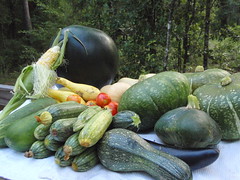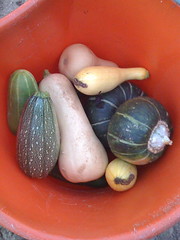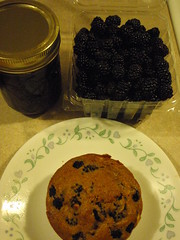
A
brief excerpt:
All of this is overseen by a handful of giant corporations that control the growth, processing and sale of food in this country. Take Monsanto, for example. It has a patent on a custom gene for soybeans. Its customers are forbidden to save their own soybean seed for use the following year. They have to buy new seed from Monsanto. If you grow soybeans outside their jurisdiction but some of the altered genes sneak into your crop from your neighbor’s fields, Monsanto will investigate you for patent infringement. They know who the outsiders are and send out inspectors to snoop in their fields.
Food labels depict an idyllic pastoral image of American farming. The sun rises and sets behind reassuring red barns and white frame farmhouses, and contented cows graze under the watch of the Marlboro Cowboy. This is a fantasy. The family farm is largely a thing of the past. When farmland comes on the market, corporations outbid local buyers. Your best hope of finding real food grown by real farmers is at a local farmers’ market. It’s not entirely a matter of “organic” produce, although usually it is. It’s a matter of food grown nearby, within the last week.
Remember how years ago you didn’t hear much about E. coli? Now it seems to be in the news once a month. People are even getting E. coli poisoning from spinach and lettuce, for heaven’s sake.
Why are Americans getting fatter? A lot of it has to do with corn syrup, which is the predominant sweetener. When New Coke failed and Coke Classic returned, it wasn’t to the classic recipe; Coke replaced sugar with corn sweeteners.
High fructose corn syrup, bringing obesity, diabetes, and heart disease to a third or more of the U.S. population.
Perhaps it’s time to do something about this.
Before you say “there’s nothing we can do” consider that even Wal-Mart has changed its food buying habits due to customer demand. We vote every time we buy food, and the one thing big corporations don’t want to lose is customers.
 Monsanto
grows much of its seed corn on the Hawaiian island of Molokai, apparently including its new “water-efficient maize”:
Monsanto
grows much of its seed corn on the Hawaiian island of Molokai, apparently including its new “water-efficient maize”:









